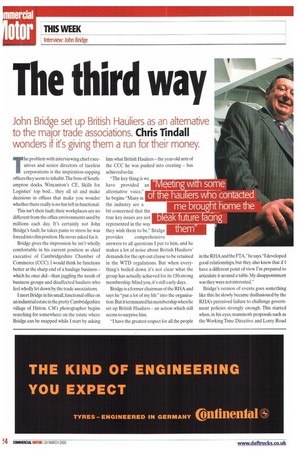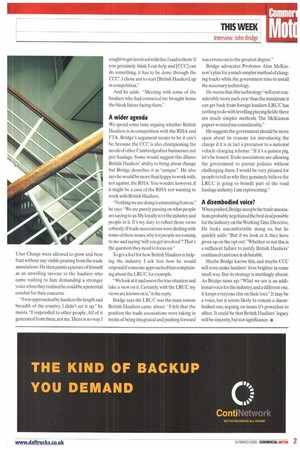The third wa
Page 24

Page 25

If you've noticed an error in this article please click here to report it so we can fix it.
John Bridge set up British Hauliers as an alternative to the major trade associations. Chris Tindall
wonders if it's giving them a run for their money.
The problem with interviewing chief executives and senior directors of faceless corporations is the inspiration-sapping offices they seem to inhabit.The boss of Southampton docks, Wincanton's CE, Skills for Logistics' top hod... they all sit and make decisions in offices that make you wonder whether there really is no fun left in functional.
This isn't their fault; their workplaces are no different from the office environments used by millions each day. It's certainly not John Bridge's fault; he takes pains to stress he was forced into this position. He never asked for it.
Bridge gives the impression he isn't wholly comfortable in his current position as chief executive of Cambridgeshire Chamber of Commerce (CCC). I would think he functions better at the sharp end of a haulage business— which he once did — than juggling the needs of business groups and disaffected hauliers who feel wholly let down by the trade associations.
I meet Bridge in his small,functional office on an industrial estate in the pretty Cambridgeshire village of Histon. CM's photographer begins searching for somewhere on the estate where Bridge can be snapped while I start by asking him what British Hauliers — the year-old arm of the CCC he was pushed into creating — has achieved so far.
"The key thing is we have provided an alternative voice," he begins."Many in the industry are a bit concerned that the true key issues are not represented in the way they wish them to be." Bridge provides comprehensive answers to all questions I put to him, and he makes a lot of noise about British Hauliers' demands for the opt-out clause to be retained in the WTD regulations. But when everything's boiled down it's not clear what the group has actually achieved for its 150-strong membership. Mind you, it's still early days.
Bridge is a former chairman of the RHA and says he "put a lot of my life" into the organisation. But it terminated his membership when he set up British Hauliers — an action which still seems to surprise him.
"I have the greatest respect for all the people in the RI-IA and the FTA," he says."I developed good relationships, but they also knew that if I have a different point of view I'm prepared to articulate it around a table. My disappointment was they were not interested."
Bridge's version of events goes something like this: he slowly became disillusioned by the RHA's perceived failure to challenge government policies strongly enough. This started when, in his eyes, mammoth proposals such as the Working Time Directive and Lorry Road User Charge were allowed to grow and bear fruit without any visible pruning from the trade associations. He then paints a picture of himself as an unwilling saviour to the hauliers who came rushing to him demanding a stronger voice when they realised he could be a potential conduit for their concerns.
"I was approached by hauliers the length and breadth of the country. I didn't set it up," he insists. "I responded to other people. All of it generated from them, not me.There is no way I sought to get involved with this. I said to them 'if you genuinely think lean help and [CCC] can do something. it has to be done through the CCC'. I chose not to start [British Hauliers] up in competition."
And he adds: "Meeting with some of the hauliers who had contacted me brought home the bleak future facing them."
A wider agenda We spend some time arguing whether British Hauliers is in competition with the RHA and ETA. Bridge's argument seems to be it can't be, because the CCC is also championing the needs of other Cambridgeshire businesses,not just haulage. Some would suggest this dilutes British Hauliers' ability to bring about change but Bridge describes it as -unique". He also says he would be more than happy to work with, not against, the RHA. You wonder, however, if it might be a case of the RHA not wanting to work with British Hauliers.
"Nothing we are doing is emanating from us," he says. "We are purely passing on what people are saying to us. My loyalty is to the industry and people in it. It's my duty to reflect those views robustly. If trade associations were dealing with some of these issues, why is it people are coming to me and saying 'will you get involved'? That's the question they need to focus on."
To get a feel for how British Hauliers is helping the industry I ask him how he would respond if someone approached him complaining about the LRUC, for example.
"We look at it and assess the true situation and take a view on it. Certainly, with the LRUC my views are known on it," is the reply.
Bridge says the LRUC was the main reason British Hauliers came about: "I felt that the position the trade associations were taking in terms of being integrated and pushing forward was erroneous to the greatest degree."
Bridge advocates Professor Alan McKinnon's plan for a much simpler method of charging trucks while the government tries to install the necessary technology.
He warns that this technology "will cost considerably more each year than the maximum it can get back from foreign hauliers. LRUC has nothing to do with levelling playing fields; there are much simpler methods. The McKinnon papers worried me considerably."
He suggests the government should be more open about its reasons for introducing the charge if it is in fact a precursor to a national vehicle charging scheme: "If it's a guinea pig, let's be honest. Trade associations are allowing the government to pursue policies without challenging them. I would be very pleased for people to tell us why they genuinely believe the LRUC is going to benefit part of the road haulage industry I am representing."
A disembodied voice?
When pushed,Bridge accepts the trade associations probably negotiated the best deal possible for the industry on the WorkingTime Directive. He looks uncomfortable doing so, but he quickly adds: "But if we look at it, they have given up on the opt out." Whether or not this is a sufficient failure to justify British Hauliers' continued existence is debatable.
Maybe Bridge knows this, and maybe CCC will even make hauliers' lives brighter in some small way. But its strategy is startlingly absent. As Bridge sums up: "What we are is an additional voice for the industry, and a different one. It keeps everyone else on their toes." It may be a voice, but it seems likely to remain a disembodied one, arguing on issues it's powerless to affect. It could be that British Hauliers' legacy will be sincerity, but not significance. •










































































































































































































